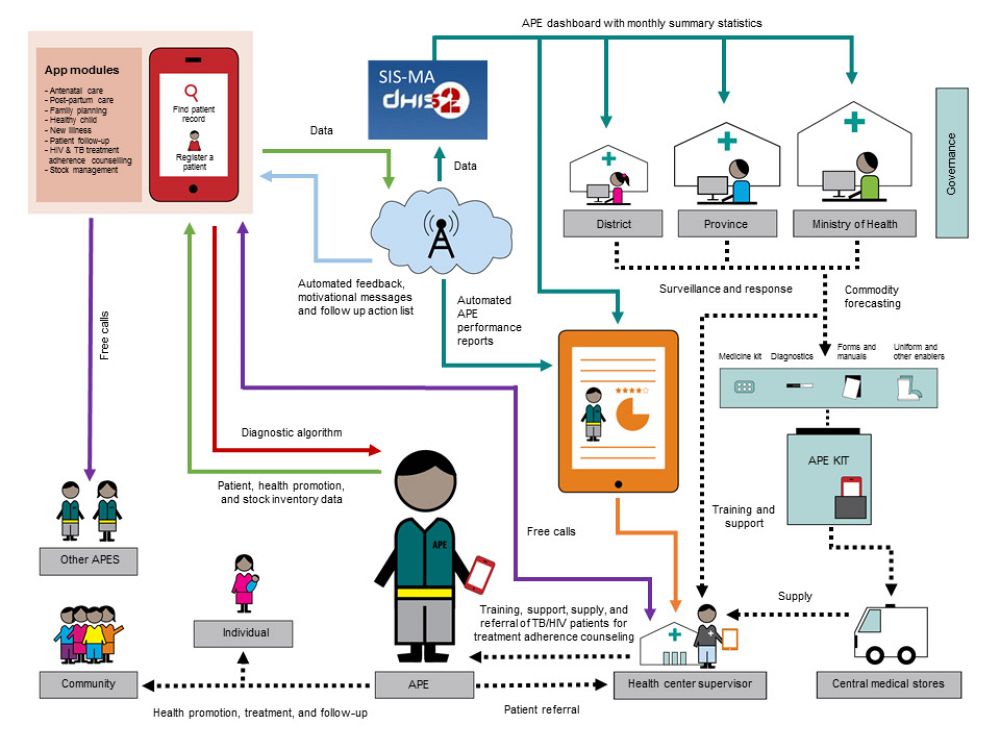
Community health workers in Mozambique, locally known as agentes polivalentes elementares (APEs), are community members that are trained to provide basic healthcare to the remote areas in which they live. Within their communities APEs conduct health-promotion activities and provide integrated community case management (iCCM) for malaria, pneumonia and diarrhoea for children aged 2-59 months. They also treat all age groups for malaria and diarrhoea and refer acute malnutrition cases, newborns, and pregnant women with danger signs. In 2014, the services APEs provide were expanded to include family planning, pregnancy tracking, antenatal care, post-partum care, healthy child check-ups, as well as TB and HIV patient follow-up for treatment adherence counseling.
Building on Malaria Consortium’s previous work in Mozambique through the Bill & Melinda Gates funded inSCALE project (2009-2016), the upSCALE project will further develop the mHealth system and APE app (formerly known as inSCALE APE CommCare), that was previously introduced in selected districts in Inhambane province, to create a national APE mHealthsystem

To build the APE mHealth system, APE level indicators will be integrated into Mozambique’s electronic District Health Information Software 2 (DHIS2) platform, known as Sistema de Informação de Saúde de Moçambique para Monitorização e Avaliação (SIS-MA). The APE-level indicators in SIS-MA will be populated in real-time from data collected by APEs and submitted directly to SIS-MA. Government health officials will be able to view this data on the APE dashboard in a user-friendly format. This system will help to assist data driven decision-making around APE programme investments, surveillance and responses to infectious diseases including malaria, and early detection of disease outbreaks.
APEs will submit data directly to SIS-MA using the ‘APE app’, an interactive mobile phone application that guides community health workers through the diagnostic process, provides treatment recommendations, issues targeted behaviour change messages for patients, and collates inputted data. The application will include the APE services that were added into the curriculum in 2014. It will be patient, rather than disease-focused, in order to promote continuous care and follow-up within the community. Dedicated modules within the application will also be developed to better assist stock management needs and preparation for community health talks.
The APE mHealth system will strengthen the links between the APE and the health facility by promoting APE supervision and performance through an integrated tablet-based application for health facility supervisors. The application enables supervisors to monitor APE case management, stock management, performance, and phone troubleshooting.
The APE mHealth system will further strengthen APE supervision and performance by providing free communication between APE peers and supervisors, as well as automated feedback, motivational messages and follow-up action lists to APEs.
Initially, the APE mHealth system will be scaled to include 256 APEs, 96 health facility supervisors, 13 district statisticians, and 13 APE coordinators. It will then be introduced to 405 APEs, 125 health facility supervisors, 17 district statisticians, and 17 APE coordinators in the province of Cabo Delgado. To ensure the long-term sustainability and utility of the APE mHealth system, Ministry of Health staff in Mozambique will drive content design, training and roll-out of the system, as well as hosting and use of the online dashboard.
See the full project brief here